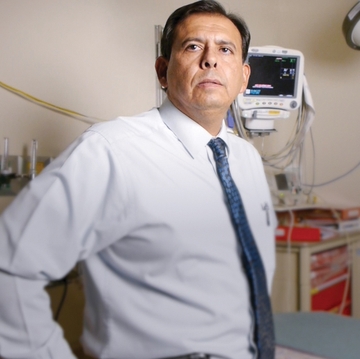Preparing for Disaster: UNM Hospital Participates in Region-Wide Emergency Training

Mind Magic
UNM Doctor Uses Hypnotherapy to Help Medical Students Manage Test Anxiety
Like many of her medical school classmates, Katina Kassicieh was dreading the make-or-break Step 1 exam - so much so that she delayed sitting for it because her mind would go blank while taking practice tests.
Then a friend told her about undergoing hypnotherapy with Robert E. Sapien, MD, professor in the Department of Emergency Medicine and associate dean for admissions in the School of Medicine.
"It was my last-ditch effort to overcome test anxiety, because it can cause you to fail, even though you know all the knowledge," Kassicieh says.
Over the course of three sessions, Sapien used hypnotic suggestion to induce a deep state of relaxation and asked Kassicieh to visualize taking the exam while feeling calm, collected and focused. The idea was to overcome her paralyzing negative self-talk, she says.
"He kind of just talks you through these lies we tell ourselves as adults," she says. "You break down these barriers in your subconscious brain that you tell yourself all day long without realizing."
When it came time to take the exam, the crippling test anxiety was gone. Now, Kassicieh regularly practices self-hypnosis at home to relax and re-center herself. And she encourages her friends to explore it as well.
Sapien says hypnotherapy changed his life when he first encountered it 15 years ago. At the time, he was intrigued by a colleague's report that hypnosis had eased his child's anxiety while undergoing a dental procedure.
"I thought it would be good to try in the Pediatric ER," he says. Sapien enrolled in a class at the Hypnotherapy Academy of America, intending to simply learn basic hypnosis.
But during that weeklong introduction, "I had a really intense emotional connection with a fellow student during an activity," he says. "It really got me thinking about the possibilities of connecting with someone on that level."
The experience that led him to undergo the academy's full course in hypnotherapy training. Today, he teaches there part-time, treats patients and has founded a professional society for hypnotherapists based on the medical model.
Hypnotherapy is nothing like "stage hypnosis," where entertainers bring audience members onstage to behave in unusual ways, Sapien says. Hypnosis is simply an altered state of consciousness that naturally induces the body's parasympathetic "relaxation response."
Patients in this state still retain their agency and cannot be made to do something that they wouldn't do otherwise, he says, but the hypnotic trance provides them access to deeply embedded beliefs and long-buried subconscious memories.
"It's really helping the individual work through limiting beliefs," says Sapien, who is careful to add, "It's an adjunct - it's not to take the place of" more conventional forms of treatment.
Sapien hopes to see greater scientific validation for the technique and recently led a study of hypnotherapy-treated patients with overactive bladder who did as well as - and in some cases better than - those who received traditional medication-only treatment.
Sapien sees about 10 medical students each year, many of whom are referred by their Learning Communities mentors. And while it might seem that highly educated people might be the least susceptible to hypnosis, the opposite is usually the case.
"It's actually those with a really developed and strong mind who are able to do this work well," Sapien says. "They're bright people. It's fun to work with them."